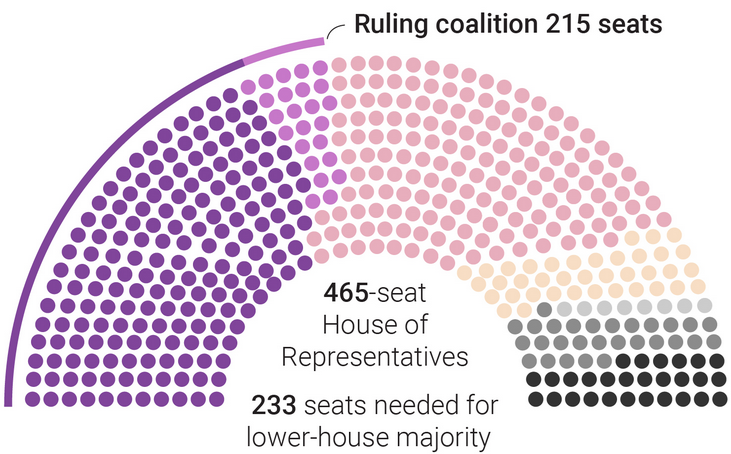Image is from this SCMP article.
Much of the analysis below is sourced from Michael Roberts' great website.
Japan's ruling parliamentary coalition, consisting of the LDP (purple) and it's junior coalition partner Komeito (in light pink) have lost their ruling majority. They have ruled post-war Japan for almost its entire history. The LDP is currently led by Shigeru Ishiba after Kishida stood down due to a corruption scandal, and ties to the Unification Church.
While geopolitical factors (over the cold war between the US and China, etc) may have played a role, by far the biggest reason for this result in the poor economic conditions over the past few years. Inflation has risen and real wages have fallen, with little relief for the working class via things like tax reductions. While inequality in Japan is not as extreme as in America, it is still profound, with the top 10% possessing 60% of the wealth, while the bottom 50% possess just 5%.
Shinzo Abe previously tried to boost economic performance through monetary easing and fiscal deficits, while Kishida ran on a "new capitalism" which rejected Abe's neoliberalism and promised to reduce inequality. Nothing substantial has resulted from all this, however, other than increasing corporate wealth. Innovation continues to fall, and domestic profitability is low, resulting in decreasing investment at home by Japanese corporations. Labour productivity growth has only slightly picked up since the mid-2000s and is falling again. The rate of profit has fallen by half since the 1960s, and Japan has been in a manufacturing recession - or very close to it - since late 2022. In essence: there is no choice but between stagnation or decline.
Please check out the HexAtlas!
The bulletins site is here!
The RSS feed is here.
Last week's thread is here.
Israel-Palestine Conflict
Sources on the fighting in Palestine against Israel. In general, CW for footage of battles, explosions, dead people, and so on:
UNRWA reports on Israel's destruction and siege of Gaza and the West Bank.
English-language Palestinian Marxist-Leninist twitter account. Alt here.
English-language twitter account that collates news.
Arab-language twitter account with videos and images of fighting.
English-language (with some Arab retweets) Twitter account based in Lebanon. - Telegram is @IbnRiad.
English-language Palestinian Twitter account which reports on news from the Resistance Axis. - Telegram is @EyesOnSouth.
English-language Twitter account in the same group as the previous two. - Telegram here.
English-language PalestineResist telegram channel.
More telegram channels here for those interested.
Russia-Ukraine Conflict
Examples of Ukrainian Nazis and fascists
Examples of racism/euro-centrism during the Russia-Ukraine conflict
Sources:
Defense Politics Asia's youtube channel and their map. Their youtube channel has substantially diminished in quality but the map is still useful.
Moon of Alabama, which tends to have interesting analysis. Avoid the comment section.
Understanding War and the Saker: reactionary sources that have occasional insights on the war.
Alexander Mercouris, who does daily videos on the conflict. While he is a reactionary and surrounds himself with likeminded people, his daily update videos are relatively brainworm-free and good if you don't want to follow Russian telegram channels to get news. He also co-hosts The Duran, which is more explicitly conservative, racist, sexist, transphobic, anti-communist, etc when guests are invited on, but is just about tolerable when it's just the two of them if you want a little more analysis.
Simplicius, who publishes on Substack. Like others, his political analysis should be soundly ignored, but his knowledge of weaponry and military strategy is generally quite good.
On the ground: Patrick Lancaster, an independent and very good journalist reporting in the warzone on the separatists' side.
Unedited videos of Russian/Ukrainian press conferences and speeches.
Pro-Russian Telegram Channels:
Again, CW for anti-LGBT and racist, sexist, etc speech, as well as combat footage.
https://t.me/aleksandr_skif ~ DPR's former Defense Minister and Colonel in the DPR's forces. Russian language.
https://t.me/Slavyangrad ~ A few different pro-Russian people gather frequent content for this channel (~100 posts per day), some socialist, but all socially reactionary. If you can only tolerate using one Russian telegram channel, I would recommend this one.
https://t.me/s/levigodman ~ Does daily update posts.
https://t.me/patricklancasternewstoday ~ Patrick Lancaster's telegram channel.
https://t.me/gonzowarr ~ A big Russian commentator.
https://t.me/rybar ~ One of, if not the, biggest Russian telegram channels focussing on the war out there. Actually quite balanced, maybe even pessimistic about Russia. Produces interesting and useful maps.
https://t.me/epoddubny ~ Russian language.
https://t.me/boris_rozhin ~ Russian language.
https://t.me/mod_russia_en ~ Russian Ministry of Defense. Does daily, if rather bland updates on the number of Ukrainians killed, etc. The figures appear to be approximately accurate; if you want, reduce all numbers by 25% as a 'propaganda tax', if you don't believe them. Does not cover everything, for obvious reasons, and virtually never details Russian losses.
https://t.me/UkraineHumanRightsAbuses ~ Pro-Russian, documents abuses that Ukraine commits.
Pro-Ukraine Telegram Channels:
Almost every Western media outlet.
https://discord.gg/projectowl ~ Pro-Ukrainian OSINT Discord.
https://t.me/ice_inii ~ Alleged Ukrainian account with a rather cynical take on the entire thing.

Super interesting, thanks for such a thorough breakdown. If these countries that have received USD loans for B&R projects decided to pay those back to China in Yuan rather than USD, would there be any benefit in that? I guess that would mean they would be accumulating USD and would have to procure Yuan through other means to do it. But I wonder if like all these countries just held on to their USD and tried not to spend it, if that would then have an effect on the power of the treasury. Or maybe it would make things worse if we went into a recession, they’d have a lot of currency that would be worth less than it was when they received the initial loan?